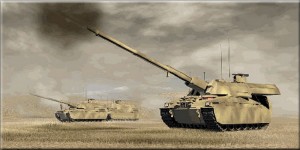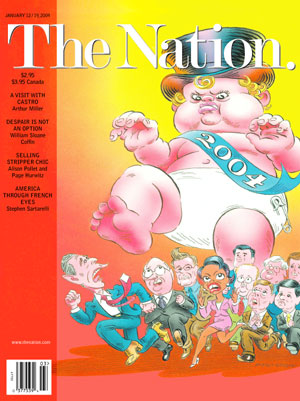 News from 2001: Before the Towers Fell
News from 2001: Before the Towers Fell
5 March 2001, Leslie Wayne,
The New York Times
During the presidential campaign last year, former President George Bush took time off from his son's race to call on Crown Prince Abdullah of Saudi Arabia at a luxurious desert compound outside Riyadh to talk about American-Saudi business affairs.
Mr. Bush went as an ambassador of sorts, but not for his government. In the same way, Mr. Bush's secretary of state, James A. Baker III, recently met with a group of wealthy people at the elegant Lanesborough Hotel in London to explain the Florida vote count.
Traveling with the fanfare of dignitaries, Mr. Bush and Mr. Baker were using their extensive government contacts to further their business interests as representatives of the Carlyle Group, a $12 billion private equity firm based in Washington that has parlayed a roster of former top-level government officials, largely from the Bush and Reagan administrations, into a moneymaking machine.
In a new spin on Washington's revolving door between business and government, where lobbying by former officials is restricted but soliciting investments is not, Carlyle has upped the ante and taken the practice global. Mr. Bush and Mr. Baker were accompanied on their trips by former Prime Minister John Major of Britain, another of Carlyle's political stars. With door-openers of this caliber, along with shrewd investment skills, Carlyle has gone from an unknown in the world of private equity to one of its biggest players. Private equity, which involves buying up companies in private deals and reselling them, is a high-end business open only to the very rich.
Over the last decade, the Carlyle empire has grown to span three continents and include investments in most corners of the world. It owns so many companies that it is now in effect one of the nation's biggest defense contractors and a force in global telecommunications. Its blue-chip investors include major banks and insurance companies, billion-dollar pension funds and wealthy investors from Abu Dhabi to Singapore.
In getting business for Carlyle, Mr. Bush has been impressive. His meeting with the crown prince was followed by a yacht cruise and private dinners with Saudi officials, including King Fahd, all on behalf of Carlyle, which has extensive interests in the Middle East.
And Mr. Bush led Carlyle's successful entry into South Korea, the fastest-growing economy in Asia. After his meetings with the prime minister and other government and business leaders, Carlyle won a tough competition for control of KorAm, one of Korea's few healthy banks.
The steady flow of politicians to lucrative private-sector jobs based on their government contacts is a familiar Washington tale. But in this case, it is being played out for more dollars, on a global stage, and in the world of private finance, where the minimal government rules prohibiting lobbying by former officials for a given period are not a factor. These rules say nothing about potential conflicts when former government officials use their connections and insights for financial gain, and they may attract more notice now that George W. Bush is president. Many of those involved with Carlyle, which invests largely in companies that do business with the government or are affected by government regulations, have ties to the Oval Office.
For instance, Frank C. Carlucci, a Reagan secretary of defense who as much as anyone is responsible for Carlyle's success, said he met in February with his old college classmate Donald H. Rumsfeld, the secretary of defense, and Vice President Dick Cheney, himself a defense secretary under former President Bush, to talk about military matters -- at a time when Carlyle has several billion-dollar defense projects under consideration.
Carlyle officials contend that the firm's activities do not present any potential conflicts since Mr. Bush, Mr. Baker and other former Republican officials now at Carlyle -- including Mr. Carlucci, who is Carlyle's chairman, and Richard G. Darman, Mr. Bush's former budget director -- do not lobby the federal government. Carlyle executives point out that many corporations have former government officials as board members.
''Mr. Bush gives us no advice on what do with with the federal government,'' said David Rubenstein, the firm's founder and a former aide in the Carter White House. ''We've gone over backwards to make sure that we do no lobbying.''
Others, however, see little difference between potential conflicts involving lobbying and those involving investments.
''Carlyle is as deeply wired into the current administration as they can possibly be,'' said Charles Lewis, executive director of the Center for Public Integrity, a nonprofit public interest group based in Washington. ''George Bush is getting money from private interests that have business before the government, while his son is president. And, in a really peculiar way, George W. Bush could, some day, benefit financially from his own administration's decisions, through his father's investments. The average American doesn't know that and, to me, that's a jaw-dropper.''
It is difficult to determine exactly how much money the senior Mr. Bush and Mr. Baker have made. Mr. Baker is a Carlyle partner, and Mr. Bush has the title senior adviser to its Asian activities. With a current market value of about $3.5 billion on Carlyle's equity and with the firm owned by 18 partners and one outside investor, Mr. Baker's Carlyle stake would be worth about $180 million if each partner held an equal stake. It is not known whether he has more or less than the other partners.
Unlike Mr. Baker, Mr. Bush has no ownership stake in Carlyle; he is an adviser and an investor and is compensated by obtaining stakes in Carlyle investments. Carlyle executives cited, for example, Mr. Bush's being allowed to put money he earns giving speeches for Carlyle into its investment funds. Mr. Bush generally receives $80,000 to $100,000 for a speech. He sits on no corporate boards other than Carlyle's.
Carlyle also gave the Bush family a hand in 1990 by putting George W. Bush, who was then struggling to find a career, on the board of a Carlyle subsidiary, Caterair, an airline-catering company.
From Carlyle's point of view, the involvement of Mr. Baker and the former president is invaluable.
''It punches up the brand awareness for us globally,'' said Daniel A. D'Aniello, a Carlyle managing director. ''We are greatly assisted by Baker and Bush. It shows that we are associated with people of the highest ethical standards.''
With $12 billion from investors, Carlyle claims to be the nation's largest private equity fund and makes money by investing in undervalued companies and reselling at a profit. These numbers put Carlyle in the same league as better-known private equity firms like Kohlberg Kravis Roberts & Company and Forstmann-Little & Company.
Two hundred forty Carlyle employees are stationed throughout the world either raising money or finding ways to spend it. Carlyle has ownership stakes in 164 companies, which last year employed more than 70,000 people and generated $16 billion in revenues. About 450 institutions -- mainly large pension funds and banks -- are Carlyle investors.
The California state pension fund invested $305 million with Carlyle, and the Texas teachers pension fund -- whose board was appointed when George W. Bush was governor -- gave Carlyle $100 million to invest in November. Carlyle also works as a financial adviser to the Saudi government.
''Let's say Carlyle is going fund-raising in the Middle East and they bring Bush along,'' said David Snow, editor of Private Equity Central, a trade publication. ''He led the U.S. Army into that region. That will catch the attention of very wealthy investors in Saudi Arabia and Kuwait. The fact that Bush is involved doesn't mean that Carlyle will make great investment decisions. But it will get them access to certain deals and certain countries that they might otherwise not have.''
One former Carlyle employee said, ''The firm understands that having Bush and Major around is like having movie stars around.''
Yet Carlyle's success is not just because of its high-powered connections. Carlyle has done well for its investors, returning an average of 34 percent a year over the last decade, in line with other private equity funds. It has done this by buying what it knows best -- companies that are regulated by the government. Nearly two-thirds of its investments are in defense and telecommunications companies, which are affected by shifts in government spending and policy.
Carlyle has become the nation's 11th largest defense contractor, owning companies that make tanks, aircraft wings and a broad array of other military equipment. It also owns health care companies, real estate, Internet companies, a bottling company and even Le Figaro, the French newspaper.
''Carlyle is one of the most successful fund-raising groups,'' said Mario L. Giannini, president of Hamilton Lane, a Philadelphia consultant to institutional investors. ''They have tremendous access and they have done very well with their money.''
And its access extends well beyond American shores. In Europe, Carlyle has assembled an advisory board that besides Mr. Major includes Karl Otto Pöhl, former president of German's Bundesbank, and the past or present chairmen of B.M.W., Hoffman-LaRoche, Nestlé, LVMH-Moët Hennessy, Louis Vuitton and Aerospatiale, the French Airbus partner.
Carlyle's Asia advisory board, which helps raise money and finds and reviews deals, includes former President Fidel V. Ramos of the Philippines, the former prime minister of Thailand and the executive director of the Abu Dhabi Investment Authority. The former South Korean prime minister Park Tae Joon was also an adviser to Carlyle.
This star power is a source of great pride for Carlyle and part of an acknowledged long-term strategy to associate the firm with brand-name politicians and business executives in order to attract more of the same -- along with their money, insights and connections. That said, Carlyle partners bristle at any suggestion that the firm's success is based only on high-powered schmoozing.
''If our track record was not good, people would not invest with us,'' said Mr. Rubenstein, the founding partner. ''No one would gives us money just because Mr. Bush is one of our advisers.''
On that point, others agree. ''People took potshots at Carlyle early on and tried to denigrate their investment credentials because they had all these government officials over there,'' said Bernard Aronson, managing partner at ACON Investments, a private equity firm in Washington. ''But that's sort of a myth. The all-hat-and-no-cattle has disappeared because they performed consistently, delivered excellent returns and have become global players.''
One of the people who put Carlyle on the map -- developing its riches and its image -- is Mr. Carlucci, who joined the firm in 1989 when it had engaged in a string of ill-fated ventures. He is credited with steering Carlyle into successful defense industry acquisitions -- just when other investors were shunning them -- and with using his seat on more than a dozen corporate boards to bring Carlyle deals and investors.
In an office adorned with photographs of Mr. Carlucci and the politically mighty -- he sits beneath an Oval Office picture of himself and Mr. Reagan -- Mr. Carlucci makes it clear that his extensive government and global ties are as fresh as ever.
''I know Rumsfeld extremely well,'' Mr. Carlucci said in an interview. ''We've been close friends throughout the years. We were college classmates.''
Pointing to a picture of the Chinese president, he said, ''There's a photo of me and Jiang Zemin. And there's me and the president of Taiwan.''
Right now, Carlyle is hoping that financing is provided for the $13.7 billion Crusader program. The Crusader is a heavy-duty tank made by a Carlyle portfolio company and other contractors. And Carlyle just lodged a complaint with the government after another of its portfolio companies lost a $4 billion contract to build a lightweight combat vehicle.
While Mr. Carlucci is open about his discussions with Mr. Rumsfeld on Pentagon policies, he said he never lobbies. ''I've made it clear that I don't lobby the defense industry,'' Mr. Carlucci said. ''I will give our Carlyle bankers advice on what they might do and who they should talk to. But I do not pick up the phone and say you should fund X, Y or Z.''
If Washington's revolving door brought Republicans to Carlyle during the Clinton presidency, now the firm is preparing for an onslaught of Democrats. The day these interviews took place at Carlyle's Washington office, Gene Sperling, one of the Clinton administration's top economic advisers, was in for a job interview.














